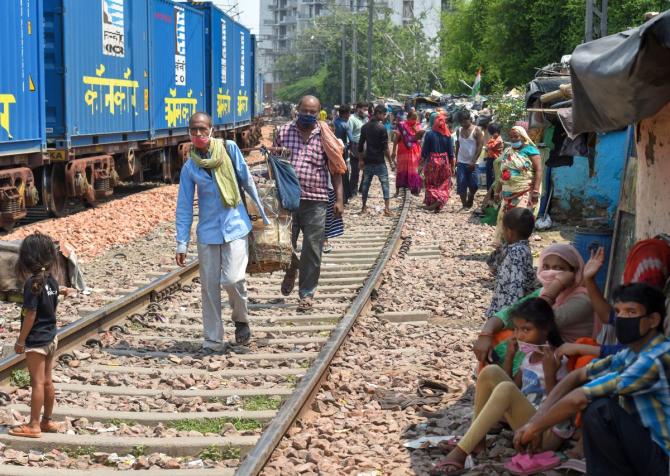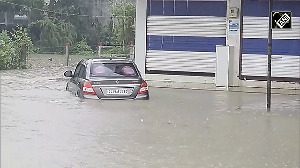'The people, media and politicians are ready to listen to the troubles of Kangana Ranaut, but we are unwanted lives in the heart of Delhi.'
Shine Jacob reports.

A Supreme Court order on August 31 threatened to upend the lives of 3,00,000 people in Delhi as it called for the removal of slums along 140 km of railway tracks within three months.
Since then, much water has flowed down the Yamuna.
Earlier this week, the Centre informed the apex court that it won't take action against slum clusters that lie within safety zones.
Solicitor General Tushar Mehta said that status quo would prevail until the Centre took a final call after consulting the Railways, the Delhi government and the urban development ministry.
But this is scant consolation for the people on the ground.
There is palpable anxiety still, especially with their lives imperilled by a pandemic.
The Centre's promise suggests that dwellings located within 15 metres of the tracks are at risk of demolition.
However, the people aren't convinced. They say officials have told them that slums outside of the 15-metre limit would be razed, too.
Virender Kohli, who has been representing the community as president of the Jhuggi Jhopri Jan Adhikar Samiti, says that the Supreme Court order was one-sided as no views were taken from slum-dwellers.
He recalls that the authorities informed slum-dwellers last week that their houses will be demolished soon.
"The people, media and politicians are ready to listen to the troubles of Kangana Ranaut, but we are unwanted lives in the heart of Delhi," says the resident of Shakur Basti, referring to the frenzied media coverage of the municipality's demolition of the actor's office in Mumbai last week.
When Business Standard visited some of the shanties in East Delhi's Dilshad Garden area, a cloud of uncertainty loomed large.
Govinda, a physically challenged 10-year-old, goes to a Delhi government school nearby and aspires to become a doctor.
"My parents have lived here for over 20 years. Now, the Railways is planning to destroy not just my house but also my dreams. Where will we go now?" asks the boy.
In recent elections since 2014, the Aam Aadmi Party and the Bharatiya Janata Party have traded the 'jahan jhuggi, wahan makan' (shelters in every slum) poll plank.
Late last week, Congress leader Ajay Maken moved the court seeking rehabilitation for the affected.
"In 1989, the Railways similarly tried to evict us from these slums. Then Prime Minister V P Singh and Atal Bihari Vajpayee lent us an ear and called our representatives to the Prime Minister's Office," says Prakash Paswan, who has been living in Block A of the Lal Bagh area for 40 years.
He adds that whereas Singh in 1990 and AAP leader Arvind Kejriwal in 2013 paid visits to shanties, "this time we feel the government wants us to be out of our homes".
The case involving the recent court order dealt with a public interest litigation on cleanliness.
"It was a Railways’ affidavit that dragged people in shanties to the issue, making them responsible for lack of cleanliness in the areas.
"The ruling also denied basic rights of the people to appeal or protest. The only option before them is to seek alternative homes," says Kabir Chaudhary Ali Zia, an advocate and social activist, who is set to approach the court.
The order said that there should be 'no interference, political or otherwise, and no court shall grant any stay with respect to removal of the encroachments in the area in question'.
Earlier this week, the Indian Railways said in a statement that it will dismantle any encroachment after consultation with the ministry of urban development and the state government.
"We are in talks with the state government. Around 48,000 shanties are expected to be dismantled. The final number will be out after an assessment and talks with the state government," V K Yadav, chairman of the Railway Board, said in response to a question by Business Standard recently.
For the people, alternative land is a major concern.
Fifty-year-old Seva Singh and his wife Sheila, who stay near Mansarovar Park, say that railway officials have already visited their place and told them to evacuate within 15 days.
"We need another place to stay. Or else, we will die here, protesting for our rights," Singh adds.
There are over 275 slums in Delhi. Several initiatives by the state government, through schemes such as the Mukhyamantri Awas Yojana, have mostly remained on paper.
"A majority of people like me here are rag-pickers. Some run small businesses and some beg for a living. Rag-pickers who remove waste are being blamed for the waste on railway stations and tracks. This is inhuman," says Bablu, who lives in Mansarovar Park.
Prem Narayan Jat, who is part of an NGO called Koshish that works in slums, says that the contributions of slum-dwellers to the economy, including informal sectors and construction activities, are being ignored.
"When the court decided to evict these people, their rehabilitation was not mentioned," he adds.
He points out that in its affidavit, which was submitted to the court before the recent order was passed, the Railways did not specify a Delhi high court judgment in 2019, which said that the slum-dwellers should be rehabilitated if the national transporter has any plan to evacuate them.
But for now, their lives are stuck in limbo.











